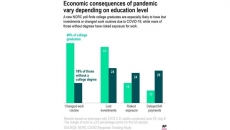Canadian households piled up a record amount of mortgage debt for the second quarter in a row amid low interest rates and high housing prices, Statistics Canada said Friday.
Hot real estate markets in many regions helped propel house prices higher, pushing demand for mortgage loans to $34.9 billion in the fourth quarter of 2020 – beating the previous high of $28.7 billion set in the third quarter, the agency said.
The growth in the value of real estate also pushed the net worth of homeowners higher, Statistics Canada said.
Residential real estate increased 3.3 per cent in value, the second consecutive quarter of strong growth, as investment in both new and existing homes remained robust, the agency said in its release.
National net worth overall increased to $357,955 from $343,172 on a per-capita basis, and by the end of the 2020, net worth had increased by more than a trillion dollars since the end of 2019, StatCan said.
Meanwhile, debt servicing and debt-to-income ratios saw an uptick in the fourth quarter but remained below pre-pandemic levels.
The household debt service ratio – measured as total obligated payments of principal and interest on credit market debt as a proportion of household disposable income – increased to 13.58 per cent from 13.18 per cent, Statistics Canada said in its release.
Still, the ratio was 9.8 per cent lower than its peak in the third quarter of 2019, the release said.
Household debt as a proportion of income rose to 175 per cent from 170.8 per cent, as debt grew slightly while household disposable income edged down, the agency said.
In other words, Canadians owed $1.75 for every dollar of household disposable income, up from $1.71 in the third quarter but still below the $1.81 Statistics Canada recorded at the end of 2019.
Canadians continued on a strong savings streak, marking the third consecutive quarter of double-digit savings rates, Statistics Canada said.
"The Canadian economy continued to recover, albeit at a slower pace, as households and businesses persisted in adjusting to the realities of the COVID-19 pandemic," the release said.
"Canadians further reduced their reliance on government support measures as employee compensation regained additional lost ground."
Yet even while government transfers and subsidies continued to wind down, declining for a second consecutive quarter, they still bolstered household savings and helped keep the savings rate high, the release said.
The increase in financial wealth helped Canadian stock markets recoup their losses from the market panic earlier in 2020, as Canadians looked for places to keep their excess savings, the agency said.
Meanwhile, the federal government continued to replace short-term borrowing with longer-term securities, issuing a record amount of bonds in the quarter, Statistics Canada said.
Canada's overall national net worth, the sum of national wealth and Canada's net foreign asset position, increased $602.9 billion from the previous quarter to $13,776.7 billion in the fourth quarter.






